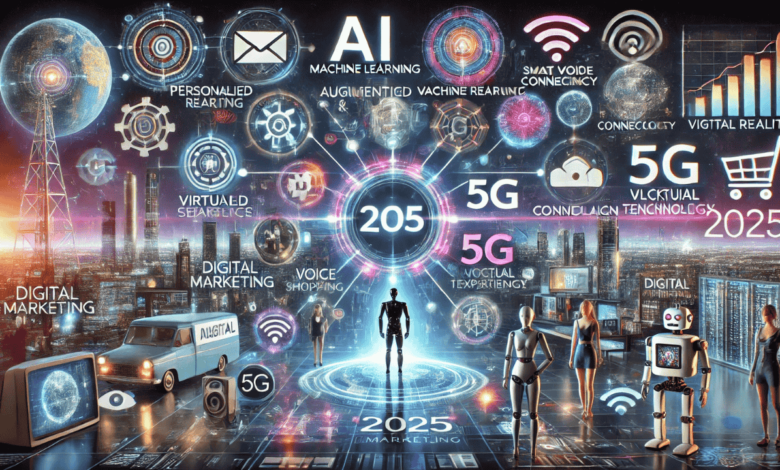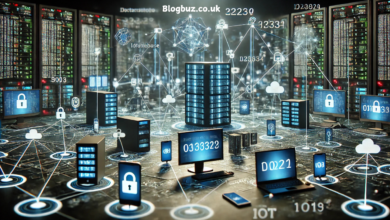Five Emerging Technologies That Will Transform Digital Marketing in 2025

As we get closer to 2025, big changes are coming to digital marketing. New technologies are going to change how businesses talk to their customers, making marketing more personal, exciting, and effective. So, what will be the five important technologies that will shape the future of digital marketing? Let’s find out.
AI and Machine Learning
Artificial Intelligence (AI) and Machine Learning (ML) are leading the way in making marketing more personal. By 2025, these technologies will be much better, offering amazing new ways to connect with customers.
AI will help create marketing campaigns that feel like they’re made just for you. It will look at lots of information about what you like and do, and then make ads that really speak to you. This means you’ll see fewer ads that don’t interest you, and more that you actually care about.
Machine learning will get really good at guessing what people might want to buy next. This will help businesses stay one step ahead, offering you products or services right when you’re thinking about them. For instance, in the e-commerce sector, Amazon has been pioneering this approach by using AI to analyse browsing history, purchase patterns, and even time spent on product pages. This deep analysis allows them to offer personalized product recommendations, significantly increasing average order value and customer satisfaction.
AI will also make websites and apps smarter. They’ll change what they show you based on how you use them, making sure you always see the most interesting stuff. This means every time you visit a website, it might look a little different, showing you things you’re more likely to enjoy or buy.
Augmented and Virtual Reality
Augmented Reality (AR) and Virtual Reality (VR) are going to make brand experiences feel more real and exciting than ever before.
Imagine being able to see how a new couch would look in your living room before you buy it, or trying on clothes without actually putting them on. That’s what AR will let you do. You’ll be able to use your phone or special glasses to see how things would look in real life, making it easier to decide what to buy. VR will take you to whole new worlds created by brands. Instead of just watching a video about a vacation spot, you might be able to take a virtual tour, feeling like you’re really there. This will help you get a much better idea of what you’re buying.
For instance, in the iGaming industry, new slot sites could use AR and VR to create immersive, interactive game environments where players can experience 3D graphics, virtual reels, and realistic settings, making the gameplay feel more like a real-world casino.
Ads will become more fun and interactive, too. Instead of just looking at a picture of a product, you might be able to play with it in AR. This will make ads feel less like ads and more like fun experiences.
Voice Search and Conversational AI
As more people use devices they can talk to, like smart speakers or voice assistants on phones, digital marketing will have to change to keep up. Businesses will need to think about how people talk when they’re looking for things online. Instead of short keywords, they’ll focus on natural phrases and questions. This means the content on websites will start to sound more like how people actually speak.
Customer service is going to get a big upgrade, too. AI chatbots will get much better at understanding and answering questions. They’ll be able to help customers at any time of day or night, and they’ll sound more and more like real people. Shopping by voice will become normal. You might be able to order your groceries or book a haircut just by talking to your smart speaker. This means businesses will need to make sure their products and services can be easily found and bought using voice commands.
In the retail sector, Walmart has partnered with Google to enable voice-based shopping through Google Assistant, making it easier for customers to reorder frequently purchased items.
Voice-activated purchasing will become mainstream, requiring businesses to optimise their e-commerce platforms for voice interactions. This trend is particularly noticeable in the smart home industry, where companies like Nest (owned by Google) use voice-activated device controls. Users can adjust thermostats, security systems, and more through simple voice commands, seamlessly integrating these products into their daily lives.
5G Connectivity
5G is a new type of internet that’s much faster than what we have now. It’s going to change how businesses can reach customers online.
With 5G, watching videos online will be super smooth, even if they’re really high quality. This means businesses can make more impressive video ads or even live-stream events without worrying about the video freezing or looking blurry.
5G will also make everything happen faster online. When you click on something, it will load instantly. This means businesses can create more interactive experiences, like games or quizzes, that work perfectly without any delay.
The Internet of Things (IoT) will grow bigger with 5G. This means more devices in your home or city will be connected to the internet. Marketers will be able to learn more about how people use these devices, helping them understand customers better and create more helpful ads and services. In the manufacturing sector, companies like Siemens are leveraging 5G in smart factories to enable real-time monitoring and predictive maintenance. This showcases the technology’s potential in B2B marketing, where real-time data and responsiveness are crucial.
Blockchain Technology
Blockchain is a new way of storing information that’s very secure and open. It’s going to help solve some big problems in online advertising. One issue in digital marketing is fake clicks on ads. Blockchain will make it easier to prove that real people see and click on ads. This means businesses won’t waste money on fake views or clicks.
Blockchain will also give people more control over their personal information. You’ll be able to choose exactly what information you share with businesses. This will help build trust between companies and customers.
Loyalty programs, like points cards for stores, will get better with blockchain. Your points will be more secure, and you might be able to use them in more places. This could make people more likely to stick with brands they like.
As we look to 2025, these five technologies are set to make big changes in digital marketing. They’ll help create marketing that feels more personal, looks more real, works faster, and keeps information safer. The future of digital marketing is exciting. It promises to make the relationship between businesses and customers more meaningful. As these technologies develop, we can expect to see new and creative ways of marketing that we haven’t even thought of yet.




